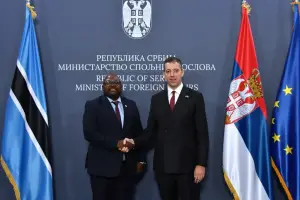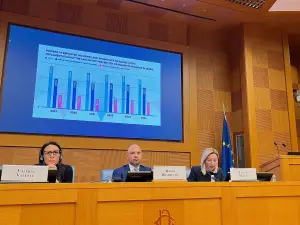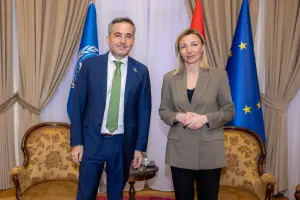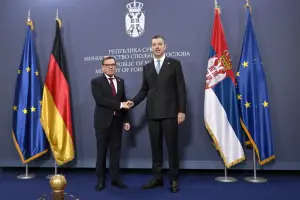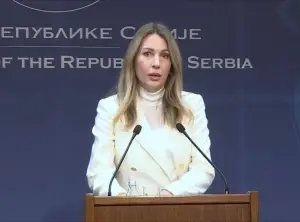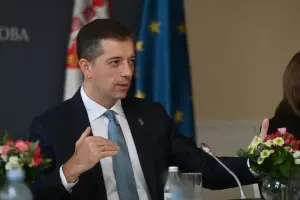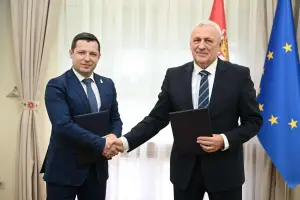Q:
A:
Sugar affair to be resolved soon
Belgrade,
8 November 2004
Serbian Deputy Prime Minister Miroljub Labus said today that the Customs Administration and the Directorate for the Fight Against Organised Crime submitted to the Serbian government two reports on the inspection of origin of 190,000 tonnes of sugar, which was exported from Serbia to the EU in 2003.
Upon his visit to Loznica, where Labus and Minister of Finance Mladjan Dinkic discussed the projection of the 2005 budget with Loznica municipality officials, Labus said that on the basis of those two reports, he sent letters to EU Commissioner for External Relations Chris Patten and the European Anti-Fraud Office, saying that the resolution of the sugar affair is expected after they make their reports.
The Deputy Prime Minister pointed out that the Customs Administration did an excellent job in this case and thus showed that it can check the origin of any goods. Labus said that the appointment of a new commissioner of the OLAF Commission is one of the reasons why the case of export of sugar from Serbia has still not been completed. He voiced hope that the dispute will be settled soon.
Minister of Finance Mladjan Dinkic said upon his visit to Loznica municipality that in the 2005 Serbian budget €75 million will be set aside for long and short-term agricultural loans.
This year, €50 million has been set aside for these purposes, with short-term loans being mostly used.
Miroljub Labus called on farmers to register their activities as soon as possible, in line with the law, so that they could make long-term plans.
He said that this year showed that all those who registered their profits received premiums on agricultural projects. He specified that 1.65 billion dinars has been set aside from this year's budget for agricultural subsidies.
Dinkic announced that the Serbian parliament's economic committee will examine a set of tax laws abolishing excise tax for diesel fuel used for tractors, construction machines and ships. In that way, diesel fuel will be cheaper by 17 dinars per litre for registered agricultural producers.
According to the new system, farmers will get identifications cards, which will contain data on the number of agricultural machines they have, arable land and the fuel they need for field works. The Minister of Finance said that the set of new tax laws will relieve farmers the obligation of paying the cadastre tax in 2004 and 2005.
According to Dinkic, a fund for micro crediting the unemployed will be established soon, which will offer loans to the unemployed who have ideas, but no funds for setting up a business. This fund will approve loans ranging from €5,000 to €20,000, with a repayment period of up to three years and a one-year grace period, with the annual interest rate held at 1 to 2 percent.
Labus, Dinkic and members of the Serbian government delegation also visited Viskoza company, a cellulose factory, where they talked with management and union representatives.
The Serbian government officials told representatives of Viskoza that it will do everything in its power to locate an investor who will set aside funds for a social welfare programme and secure the factory's expansion to the global market.
Viskoza has great chances to complete the privatisation process next year. It is estimated that a potential investor should inject at least €50 million so that the factory could become competitive and use the maximum of its capacities.
Labus highlighted during the talks with local businessmen that the local community must create a favourable environment for development of small and medium-sized enterprises.
The Serbian government will do everything in its power to create a favourable environment for SMEs development on the republic level as well, said Labus, and added that the question of interest rates is crucial for that.
The government will also seek to reduce interest rates, because the current level of 2 to 2.5 percent that is paid for dinar loans is too high.
Labus stressed that the government advocates the creation of a private and competitive market and that it has no intention of controlling prices.
The Deputy Prime Minister explained that it is necessary to restructure public enterprises. That will be part of reform and economic policy for 2005.
Apart from Deputy Prime Minister Miroljub Labus and Minister of Finance Mladjan Dinkic, the delegation which visited Loznica also included Assistant Minister of Finance Goran Andjelic, Tax Administration Director Vladimir Ilic, Customs Administration Director Dragan Jerinic, Deputy Prime Minister's Advisor for Energy Zorana Milanovic and Privatisation Agency representative Ivan Nikolic.
The Deputy Prime Minister pointed out that the Customs Administration did an excellent job in this case and thus showed that it can check the origin of any goods. Labus said that the appointment of a new commissioner of the OLAF Commission is one of the reasons why the case of export of sugar from Serbia has still not been completed. He voiced hope that the dispute will be settled soon.
Minister of Finance Mladjan Dinkic said upon his visit to Loznica municipality that in the 2005 Serbian budget €75 million will be set aside for long and short-term agricultural loans.
This year, €50 million has been set aside for these purposes, with short-term loans being mostly used.
Miroljub Labus called on farmers to register their activities as soon as possible, in line with the law, so that they could make long-term plans.
He said that this year showed that all those who registered their profits received premiums on agricultural projects. He specified that 1.65 billion dinars has been set aside from this year's budget for agricultural subsidies.
Dinkic announced that the Serbian parliament's economic committee will examine a set of tax laws abolishing excise tax for diesel fuel used for tractors, construction machines and ships. In that way, diesel fuel will be cheaper by 17 dinars per litre for registered agricultural producers.
According to the new system, farmers will get identifications cards, which will contain data on the number of agricultural machines they have, arable land and the fuel they need for field works. The Minister of Finance said that the set of new tax laws will relieve farmers the obligation of paying the cadastre tax in 2004 and 2005.
According to Dinkic, a fund for micro crediting the unemployed will be established soon, which will offer loans to the unemployed who have ideas, but no funds for setting up a business. This fund will approve loans ranging from €5,000 to €20,000, with a repayment period of up to three years and a one-year grace period, with the annual interest rate held at 1 to 2 percent.
Labus, Dinkic and members of the Serbian government delegation also visited Viskoza company, a cellulose factory, where they talked with management and union representatives.
The Serbian government officials told representatives of Viskoza that it will do everything in its power to locate an investor who will set aside funds for a social welfare programme and secure the factory's expansion to the global market.
Viskoza has great chances to complete the privatisation process next year. It is estimated that a potential investor should inject at least €50 million so that the factory could become competitive and use the maximum of its capacities.
Labus highlighted during the talks with local businessmen that the local community must create a favourable environment for development of small and medium-sized enterprises.
The Serbian government will do everything in its power to create a favourable environment for SMEs development on the republic level as well, said Labus, and added that the question of interest rates is crucial for that.
The government will also seek to reduce interest rates, because the current level of 2 to 2.5 percent that is paid for dinar loans is too high.
Labus stressed that the government advocates the creation of a private and competitive market and that it has no intention of controlling prices.
The Deputy Prime Minister explained that it is necessary to restructure public enterprises. That will be part of reform and economic policy for 2005.
Apart from Deputy Prime Minister Miroljub Labus and Minister of Finance Mladjan Dinkic, the delegation which visited Loznica also included Assistant Minister of Finance Goran Andjelic, Tax Administration Director Vladimir Ilic, Customs Administration Director Dragan Jerinic, Deputy Prime Minister's Advisor for Energy Zorana Milanovic and Privatisation Agency representative Ivan Nikolic.



